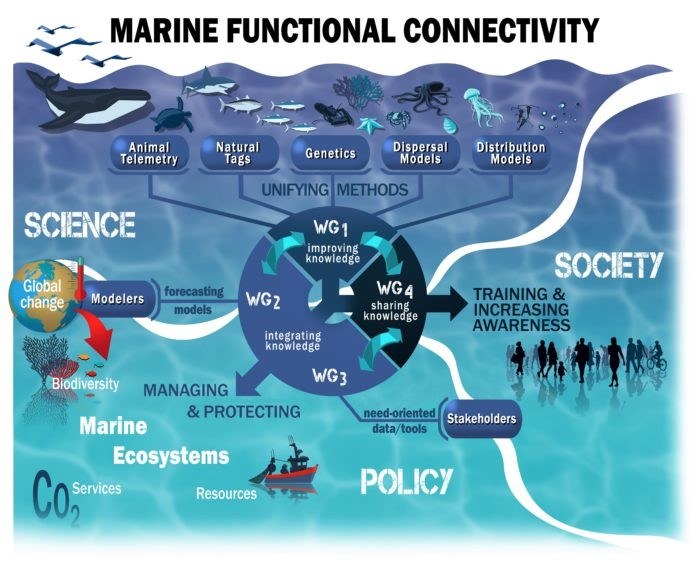Project news Knowledge of marine connectivity is essential to support a sustainable blue economy
Oceans and seas cover more than 70% of the Earth's surface and provide several important ecosystem services, such as food supply and climate regulation. At the same time, marine ecosystems are exposed to numerous (human) threats, such as habitat loss, overfishing and global warming. Sustainable management of these marine ecosystems is therefore essential, but knowledge about the functioning and connectivity of habitats and various ecosystem components is still insufficient. Increasing that knowledge is the goal of the new COST network initative SEA-UNICORN.

Ecologically, the term 'connectivity' refers to all movements of living organisms and how these movements - in addition to nutrient, biomass and material flows - are facilitated by the (marine) landscape. Whereas the 'structural' component of this concept is mainly related to the physical characteristics (connections vs. barriers) of the marine habitats, the term 'functional connectivity' refers to the effective exchange of genes or biomass of all kinds of organisms between the heterogeneous habitats. This functional connectivity, in particular, helps determine the demographic, ecological and evolutionary interdependence of populations and communities, and thus the healthy functioning of ecosystems.
The new COST Action SEA-UNICORN (Unifying Approaches to Marine Connectivity for better Resource Management for the Seas) brings together a broad interdisciplinary community of scientists, stakeholders and policy makers from more than 100 organizations from across Europe and beyond, to advance our knowledge and unify the many concepts and approaches in the still relatively young field of Marine Functional Connectivity (MFC). Indeed, in the context of sustainable ocean development, knowledge of structural and functional connectivity can help not only to conserve vulnerable species and ecosystems and control the spread of invasive species, pathogens and escaped aquaculture animals, but also to establish effective networks of protected areas, and promote sustainable fisheries management.
ILVO researcher Kris Hostens: "ILVO is involved in several work packages of this SEA-UNICORN project. Not only our knowledge of various fish populations, fish habitats, genetic research on subpopulations, ecosystem modeling, research on age (day and year rings in the otoliths (ear stones) of fish), but also our structural and functional habitat and species research on various ecosystem components (macrobenthos, larger invertebrates, fish larvae, etc.) are a huge added value for this interdisciplinary project. The integration of all this knowledge will certainly help to underpin the Common Fisheries Policy in Europe and the various Habitat and Environment Directives at both the Flemish and Federal levels."
The challenge
Marine ecosystems are difficult to access, which makes quantifying connectivity extremely difficult. Research on marine (functional) connectivity has so far focused on species-specific approaches to describe the movements and distributions of individuals and populations, this using a wide range of complementary direct and indirect methods from multiple research areas. More recently, methods have been developed that attempt to link species-specific movements and characteristics to particular ecosystem functions, allowing us to better understand the complex relationships between marine species or communities and the different habitats in which they reside. Integrating all this knowledge will allow marine management and conservation strategies to be refined and greatly improved.
Information on MFC is already available for most marine ecoregions and a wide range of aquatic organisms (from viruses to whales). However, several methodological barriers and knowledge gaps need to be addressed to understand MFC at a broad scale and to predict how global changes (e.g., climate warming) can and will affect functional connectivity.

The COST Action
The SEA-UNICORN COST Action brings together scientists from diverse research teams, disciplines and countries. Members have expertise in diverse oceans and seas and key marine taxa (from viruses to whales), including invasive species and species that connect the land-sea interface. This broad approach will allow us to make strong progress in the field of MFC and generate important academic and applied results. The SEA-UNICORN project contributes to at least four of the SDGs (sustainable development goals) of the EU. The action will forge stronger links between scientists, policy makers and stakeholders to promote the integration of MFC knowledge into decision support tools for marine management and environmental policies. The integration will certainly help to prioritize appropriate conservation measures in the context of spatial planning and support the needs of national and international managers and policy makers regarding marine management.